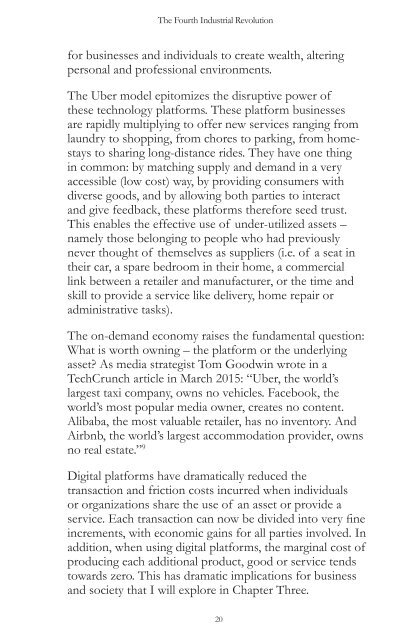The Fourth Industrial Revolution
WEF_The_Fourth_Industrial_Revolution
WEF_The_Fourth_Industrial_Revolution
You also want an ePaper? Increase the reach of your titles
YUMPU automatically turns print PDFs into web optimized ePapers that Google loves.
<strong>The</strong> <strong>Fourth</strong> <strong>Industrial</strong> <strong>Revolution</strong><br />
for businesses and individuals to create wealth, altering<br />
personal and professional environments.<br />
<strong>The</strong> Uber model epitomizes the disruptive power of<br />
these technology platforms. <strong>The</strong>se platform businesses<br />
are rapidly multiplying to offer new services ranging from<br />
laundry to shopping, from chores to parking, from homestays<br />
to sharing long-distance rides. <strong>The</strong>y have one thing<br />
in common: by matching supply and demand in a very<br />
accessible (low cost) way, by providing consumers with<br />
diverse goods, and by allowing both parties to interact<br />
and give feedback, these platforms therefore seed trust.<br />
This enables the effective use of under-utilized assets –<br />
namely those belonging to people who had previously<br />
never thought of themselves as suppliers (i.e. of a seat in<br />
their car, a spare bedroom in their home, a commercial<br />
link between a retailer and manufacturer, or the time and<br />
skill to provide a service like delivery, home repair or<br />
administrative tasks).<br />
<strong>The</strong> on-demand economy raises the fundamental question:<br />
What is worth owning – the platform or the underlying<br />
asset? As media strategist Tom Goodwin wrote in a<br />
TechCrunch article in March 2015: “Uber, the world’s<br />
largest taxi company, owns no vehicles. Facebook, the<br />
world’s most popular media owner, creates no content.<br />
Alibaba, the most valuable retailer, has no inventory. And<br />
Airbnb, the world’s largest accommodation provider, owns<br />
no real estate.” 9<br />
Digital platforms have dramatically reduced the<br />
transaction and friction costs incurred when individuals<br />
or organizations share the use of an asset or provide a<br />
service. Each transaction can now be divided into very fine<br />
increments, with economic gains for all parties involved. In<br />
addition, when using digital platforms, the marginal cost of<br />
producing each additional product, good or service tends<br />
towards zero. This has dramatic implications for business<br />
and society that I will explore in Chapter Three.<br />
20


